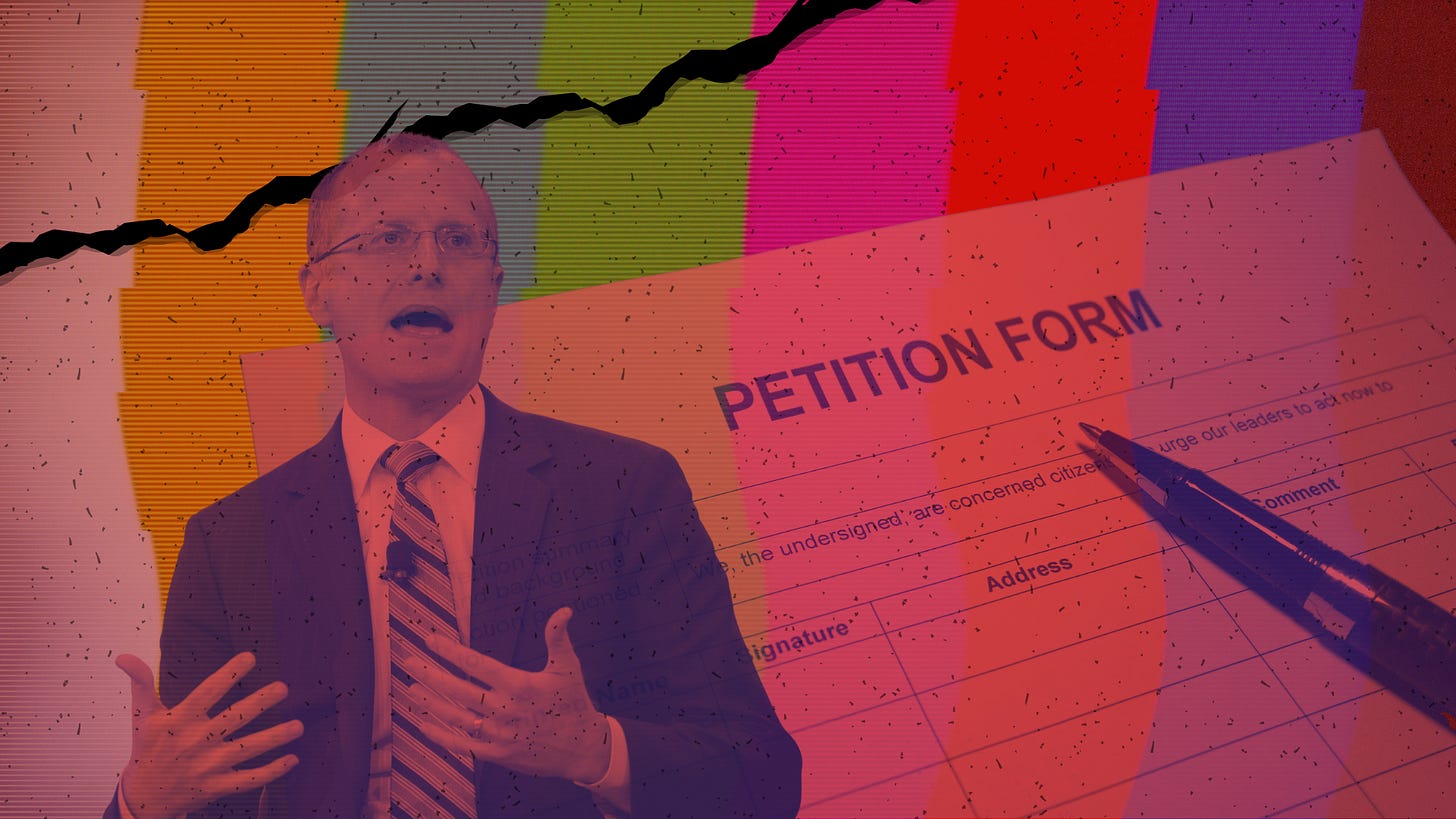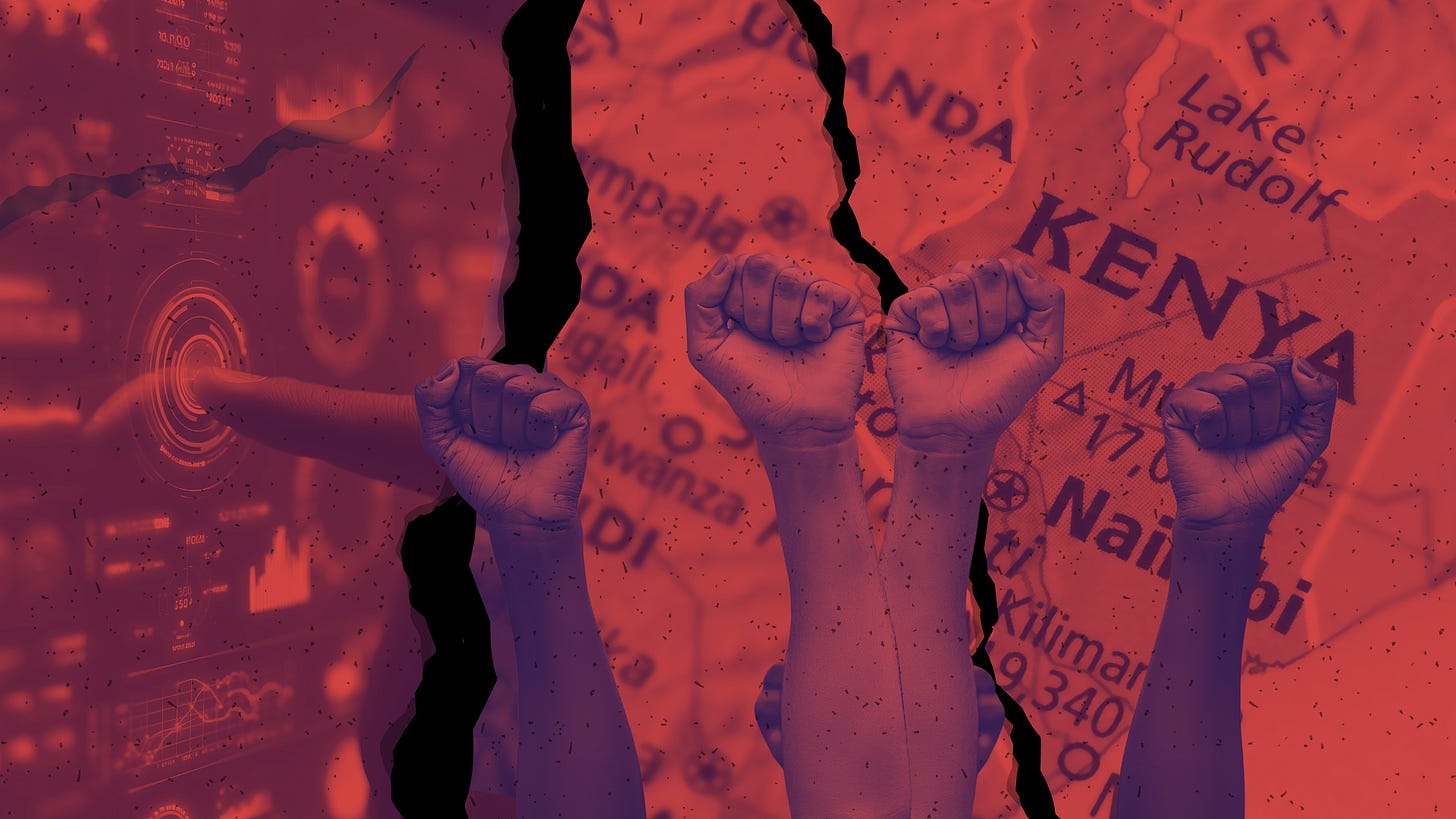Kenya Wages Digital Campaign to Suppress Protests & China Targets Social Media Influencers | The Free Flow 11/20/25
Former FCC leaders petition to repeal 'news distortion' policy, Ireland probes X's user-appeal mechanisms, China offers $35k reward for influencers accused of 'separatism,' and more.
This Week At A Glance 🔎
— 🇺🇲 Former FCC Leaders Petition Against ‘News Distortion’ Policy
— 🇨🇳 China Offers $35,000 Reward for Influencers Accused of ‘Separatism’
— 🇰🇪 Report Reveals Kenyan Government Used Tech to Suppress Protests
— 🇮🇪 Ireland Probes X’s User-Appeal Mechanisms
— 🇰🇿 Kazakhstan Advances ‘LGBTQ-Propaganda’ Ban
First of All 🇺🇲

» Former FCC Leaders Petition to Repeal ‘News Distortion’ Policy
A group of former Federal Communications Commission leaders has petitioned for the agency to repeal its long-standing “news distortion” policy, claiming it is being used as a “cudgel” against the media.
About the policy:
The policy allows the agency to sanction broadcasters if “they have deliberately distorted a factual news report.”
Although it has not actually been codified, the policy originated from an FCC standard for evaluating broadcasters.
For decades, it has been rarely used, until FCC Chair Brendan Carr cited it in several high-profile disputes this year, including discussions surrounding Jimmy Kimmel at ABC and the investigation of “60 Minutes” at CBS.
About the petition:
Legal and advocacy nonprofits Protect Democracy and Tech Freedom filed the petition, which was signed by several former FCC chairs and commissioners.
“Wielding the news distortion policy, the FCC has already opened or threatened to open investigations against private broadcasters due to disagreements with editorial decisions or statements made in a comedic monologue,” the petition said.
FCC Response: In response to the petition, Carr wrote on X “How about no. On my watch, the FCC will continue to hold broadcasters accountable to their public interest obligations.”
» Law Professor Sues University Over Alleged Retaliation for Criticism of Israel
Ramsi Woodcock, a tenured law professor at the University of Kentucky, has sued the school after he was banned from teaching, advising students, attending faculty meetings, and accessing the law school following comments he made about Israel.
Details:
Woodcock was placed under investigation in July over allegations that he violated a university policy, which includes the International Holocaust Remembrance Alliance (IHRA) definition of antisemitism that the state senate directed all public universities to use in April.
Under the IHRA definition, antisemitism “might include the targeting of the state of Israel, conceived as a Jewish collectivity,” or “claiming that the existence of a state of Israel is a racist endeavor.”
The investigation was initiated by complaints made at off-campus academic conferences, on Woodstock’s website, and in private Association of American Law Schools chat groups from individuals not part of the university.
The university found that his comments, which characterize Israel as a “colonization project” and call for military interventions against it, “threaten[ed] the safety and well-being of the university’s students and staff.”
This marks the first lawsuit filed by a professor against a university, challenging the constitutionality of the IHRA definition and the application of federal Title VI anti-discrimination protections to criticism of Israel.
The Digital Age 🤖
» Report Reveals Kenyan Government Used Tech-Violence to Suppress Protests
A new report from Amnesty International reveals that Kenyan authorities led a coordinated campaign on digital platforms to suppress Gen Z protests between June 2024 and July 2025.
The government’s efforts included online threats, intimidating comments, abusive language, smearing, and targeted disinformation.
Details:
Amnesty International Secretary General Agnès Callamard said their research proved state-sponsored trolls and individuals drove the campaigns.
Authorities are accused of paying a network of people to promote and amplify pro-government messages, particularly on X, where they mass-posted identical messages to manipulate the platform’s algorithm.
» China Offers $35k Reward for Influencers Accused of ‘Separatism’
Chinese police issued a warning notice and $35,000 reward for two Taiwanese social media influencers, Pa Chiung and Chen Po-yuan, accused of ‘separatism.’
Details:
The pair is well-known for their public criticism of China and has dismissed the threats.
The action comes a month after an investigation was launched into Puma Shen, a lawmaker part of Taiwan’s ruling Democratic Progressive Party, who faced the same accusations.
The Brussels Effect: Europe and Beyond 🇪🇺
» Ireland Probes X’s User-Appeal Mechanisms
Ireland’s media regulator, Coimisiún na Meán, has announced plans to investigate social media platform X over its user-appeal processes.
Background:
The Coimisiún has said that X may be in violation of the EU Digital Services Act, which requires platforms to provide users with effective means to lodge complaints and appeal decisions.
If the investigation finds that X violates the DSA, the platform could face fines up to 6 percent of its annual turnover.
What it will test:
Whether people can appeal the platforms’ decisions not to remove content that seemingly breaches their terms of service.
Whether people are told about the outcome of reports they’ve made.
Whether X has an easy, accessible mechanism to make complaints.
» Collège de France Cancels ‘Palestine and Europe’ Conference Amid Pressure
The Collège de France has cancelled the international conference “Palestine and Europe: The Weight of the Past and Contemporary Dynamics,” which was scheduled for November 13 and 14.
Media reports indicate that the school may have been pressured by French officials.
Details:
The Collège’s statement cited concerns over safety and public order, and reiterated its commitment to “strict neutrality with regard to issues of a political or ideological nature.”
In a letter to the school, leaked to the press, French Minister of Higher Education Philippe Batiste told school administrators, “I doubt that you are in a position to guarantee a debate in which the pluralism of ideas can be fully expressed.”
At Le Monde, a group of professors from the institution criticized the decision: “While aware of the pressures surrounding its organization and the resulting administrative responsibilities, we regret this decision, which disproportionally prioritizes security concerns over respect for academic freedom…”
Batiste denied exerting pressure and assured news outlets that it was the Collège’s “sole decision to cancel the conference” while also expressing concerns that the event “carried a risk of public disorder.”
» Spain Launches Package to Fight Digital Threats
The President of Spain, Pedro Sánchez, announced a package of measures to address disinformation campaigns, protect minors, combat hate speech, and safeguard privacy.
There is not much information about the measures at this time.
Free Speech Recession 🌍
» Kazakhstan Advances Ban on ‘LGBTQ+ Propaganda’
Kazakhstan’s lower chamber of parliament has advanced a ban on “the dissemination of information containing propaganda of pedophilia and/or non-traditional sexual orientation” in public spaces, media, or online.
Details:
The law mirrors Russia’s 2022 ban on LGBTQ+ propaganda, and was pushed ahead while the country’s president, Kassym-Jomart Tokayev, met with Russia’s President, Vladimir Putin.
Kazakhstan’s Senate must still approve the package before it becomes law, which the lower parliament said is designed to “protect children from content harmful to their health and development.”
» Film Festival in New York Suspended After China Pressured Filmmakers
Zhu Rikun, director of the inaugural IndieChina Film Festival in New York City, has suspended the event two days before it was scheduled to take place, citing concerns about the harassment of filmmakers.
Details:
Zhu said he received messages from participating filmmakers, directors, and producers from China that they and their relatives were facing harassment.
Several participants pulled out of the festival with little to no explanation, while a few said they or their family members had been told to do so by Chinese authorities.
Before moving to New York, Zhu had co-founded the Beijing Independent Film Festival, which was shut down, along with two other major independent festivals in China, after Xi Jinping became President in 2012.
IndieChina was Zhu’s first attempt at hosting a film festival focused on Chinese independent films that could avoid censorship.
» Belarusian Journalists Sentenced to Confinement for ‘Extremism’
Belarusian authorities added four journalists from the Baranavichy news outlet BAR24 to a list of individuals involved in “extremist activity” and sentenced them to home confinement.
Details:
Journalists Natallia Semianovich, Mikita Piatrouski, Ruslan Raviaka, and Ludmila Zeliankova were convicted for “aiding extremist activity.”
The outlet, BAR24, was created by the former team of the independent regional newspaper, Intex-Press, which has clashed with authorities several times, including mass staff detentions in December 2024 and a property search and seizure in February 2023.
Intex-Press’ website was blocked in Belarus in May 2023, which Brest Region prosecutor Viktar Klimau said, “repeatedly published information that clearly portrayed the socio-political situation in the country negatively after the election campaign and discredited the work of state and law-enforcement bodies.”
» Russian Politician Sentenced to Prison in Absentia for ‘Justifying Terrorism’
Leonid Gozman, an exiled Russian politician, has been sentenced to 10 years in prison in absentia by a Moscow military court for “justifying terrorism.”
Details:
The charges stem from a 2023 interview with a “foreign media outlet” during which Gozman allegedly expressed approval for Ukrainian drone strikes targeting Moscow and bomb attacks on the bridge connecting Russia with annexed Crimea.
The foreign outlet was a Russian-language edition of the German tabloid Bild.
Gozman was added to Russia’s list of ‘terrorists and extremists’ this year and was sentenced the year before to eight and a half years in prison in absentia for spreading disinformation about the military.
He fled Russia in 2022, after serving two consecutive 15-day jail terms for blog posts made in 2013 and 2020 comparing the Soviet government to the Nazi regime.
Ashley Haek is a communications coordinator and research assistant at The Future of Free Speech.
Ava Sjursen is a communications intern at The Future of Free Speech and a student at Boston College studying communications and political science.






The contrast between Carrs stance on holding broadcasters acountable and the former FCC leaders concerns about it becoming a cudgel is striking. Given how rarely this policy was used before, the sudden increase in citations does raise questions about weather its being applied consistently or selectively.